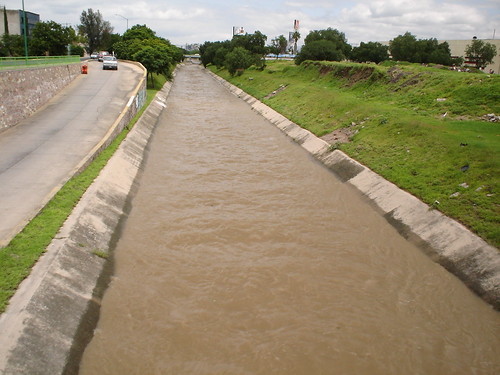Water is scarce, we should learn how to manage the common pool resource, we need to design more robust institutions for water management, integrated watershed management is the way to go, etc. All of these are phrases that have become commonplace in the literature on water governance. Interestingly enough, the public seems to think about the hydrological cycle in a non-holistic way. The “culture of flushing” is what enables people to forget about the water we just polluted as soon as we see it flush away (Benidickson 2007).
Traditionally, social science scholars have been preoccupied with issues of water availability, to the detriment of the study of polluted effluents. This attention is partially warranted given that according to the most recent statistics by the World Water Assessment Project, nearly 50% of the global population will be living in areas of high water stress (Revenga 2005, WWAP 2005).
Interestingly, the concept of the hydrological cycle (a natural science idea) seems to be somewhat absent in the mind of policy-makers and social scientists alike. For the past five years, I have been working (Pacheco-Vega 2005a, b, Pacheco-Vega 2008) on highlighting the closed nature of the hydrological cycle and the need to reduce the amount of water we pollute. Undertaking a global water balance allows us to understand the implications of water pollution, the morbidity associated with contaminated drinking water, the prevalence of waterborne diseases and the need for secondary and tertiary wastewater treatment.

UNEP/GRID-Arendal (2002), Urban water cycle, Available at http://maps.grida.no/go/graphic/urban_water_cycle (Accessed 14 February 2009)
2008 was declared by the United Nations as the International Year of Sanitation, although it is quite clear that wastewater and sanitation aren’t the main focus of social science water research. However, as it can be seen from the urban water cycle graphic shown above, there is still a lot of room for improvement. All those wastewater streams can be improved in quantity (volume reduction at the source using ecological or low-water toilets) and quality (primary/secondary treatment at the source using domestic wastewater treatment plants).
If we are really going to accelerate progress towards the Millennium Development Goal (MDG) target to reduce by half the proportion of the 2,6 billion people without access to basic sanitation by 2015, we need to start from the basics.
References and further reading
Benidickson, J. (2007) The Culture of Flushing: A Social and Legal History of Sewage. Vancouver, UBC Press.
Pacheco-Vega, R. (2005a ) “Applying the Institutional Analysis and Development framework to wastewater management policy in the Lerma-Chapala River Basin”. Presented at the UNU-INWEH/UNESCO-MAB-IHP International Workshop “Water and Ecosystems: Water Resources Management in Diverse Ecosystems and Providing for Human Needs”, Hamilton, Ontario, Canada. June 14-16, 2005.
Pacheco-Vega, R. (2005b) “Institutional analysis within the Lerma-Chapala Region: New challenges for watershed management”. Presented at the conference “Institutional Analysis for Environmental Decision-Making: A Workshop”. Fort Collins, Colorado, USA. Jan 28 and 29, 2005
Pacheco-Vega, R. (2008) “Strengthening effective wastewater governance in Mexico: Is there a role for river basin councils?” Presented at the Environmental Studies Association of Canada Meeting, Canadian Social Sciences and Humanities Congress, June 2008, Vancouver, Canada


One Response
Stay in touch with the conversation, subscribe to the RSS feed for comments on this post.
Continuing the Discussion